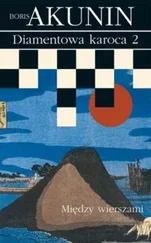The catastrophe was an appalling sight: a column of water and steam, splashed up into the air as the locomotives crashed down into the water, upended flat wagons with massive steel structures tumbling off them and – most terrible of all – a hail of tiny human figures showering downwards.
Glyceria Romanovna huddled against Rybnikov’s shoulder and started squealing piercingly. Other passengers were screaming too.
The tail-end carriage of the special, probably reserved for officers, teetered on the very edge of the break. Someone seemed to jump out of the window just in time, but then the bridge support buckled and the carriage went plunging downwards too, into the heap of twisted and tangled metal protruding from the water.
‘My God, my God!’ Lidina started screaming hysterically. ‘Why are you just looking? We have to do something!’
She dashed out into the corridor. Vasilii Alexandrovich hesitated for only a second before following her.
‘Stop the train!’ the small lady gabbled hysterically, throwing herself on the conductor-in-chief, who was running towards the leading carriage. ‘There are wounded men there! They’re drowning! We have to save them!’
She grabbed him by the sleeve so tenaciously that the railwayman had no choice but to stop.
‘What do you mean, save them? Save who? In that shambles!’ Pale as death, the captain of the train crew tied to pull himself free. ‘What can we do? We have to get to a station, to report this.’
Glyceria Romanovna refused to listen and pounded him on the chest with her little fist.
‘They’re dying, and we just leave them? Stop! I demand it!’ she squealed. ‘Press that emergency brake of yours, or whatever you call it!’
Hearing her howling, a dark-complexioned man with a little waxed moustache put his head out of the next compartment. Seeing the captain of the train hesitate, he shouted menacingly:
‘Don’t you dare stop! I’ve got urgent business in Moscow!’
Rybnikov took Lidina gently by the elbow and started speaking soothingly:
‘Really and truly, madam. Of course, it’s a terrible disaster, but the only thing we can do to help is telegraph as soon as possible from the next …’
‘Ah, to hell with all of you!’ shouted Glyceria Romanovna.
She darted to the emergency handle and pulled it.
Everyone in the train went tumbling head over heels to the floor. The train gave a hop and started screeching sickeningly along the rails. There were howls and screams on every side – the passengers thought their train had crashed.
The first to recover his senses was the man with the dark complexion, who had not fallen, but only banged his head against the lintel of the door.
With a cry of ‘You rrrotten bitch, I’ll kill you!’ he threw himself on the hysterical woman, who had been stunned by her fall, and grabbed her by the throat.
The small flames that glinted briefly in Vasilii Alexandrovich’s eyes suggested that he might possibly have shared the swarthy gentleman’s bloody intentions to some extent. However, there was more than just fury in the glance that the staff captain cast at Glyceria Romanovna as she was being strangled – there was also something like stupefaction.
Rybnikov sighed, grabbed the intemperate dark-haired man by the collar and tossed him aside.
The fourth syllable, in which a hired gun sets out on the hunt
The phone rang at half past one in the morning. Before he even lifted the receiver to answer, Erast Petrovich Fandorin gestured to his valet to hand him his clothes. A telephone call at this hour of the night could only be from the Department, and it had to be about some emergency or other.
As he listened to the voice rumbling agitatedly in the earpiece, Fandorin knitted his black eyebrows tighter and tighter together. He switched hands, so that Masa could slip his arm into the sleeve of a starched shirt. He shook his head at the shoes – the valet understood and brought his boots.
Erast Petrovich did not ask the person on the phone a single question, he simply said:
‘Very well, Leontii Karlovich, I’ll be there straight away.’
Once he was dressed, he stopped for a moment in front of the mirror. He combed his black hair threaded with grey (the kind they call ‘salt-and-pepper’), ran a special little brush over his entirely white temples and his neat moustache, in which there was still not a single silver hair. He frowned after running his hand across his cheek, but there was no time to shave.
He walked out of the apartment.
The Japanese was already sitting in the automobile, holding a travelling bag in his hand.
The most valuable quality of Fandorin’s valet was not that he did everything quickly and precisely, but that he knew how to manage without unnecessary talk. From the choice of footwear, Masa had guessed there was a long journey in prospect, so he had equipped himself accordingly.
With its mighty twenty-horsepower engine roaring, the twin-cylinder Oldsmobile surged down Sadovaya Street, where Fandorin was lodging, and a minute later it was already gliding across the Chernyshevsky Bridge. A feeble drizzle was trickling down from the grey, unconvincing night sky, and glinting on the road. The remarkable ‘Hercules’ brand non-splash tyres glided over the black asphalt.
Two minutes later the automobile braked to a halt at house number 7 on Kolomenskaya Street, where the offices of the St Petersburg Railway Gendarmerie and Police were located.
Fandorin set off up the steps at a run, with a nod to the sentry, who saluted him. But his valet remained sitting in the Oldsmobile, and even demonstratively turned his back.
From the very beginning of the armed conflict between the two empires, Masa – who was Japanese by birth, but a Russian citizen according to his passport – had declared that he would remain neutral, and he had stuck scrupulously to this rule. He had not delighted in the heroic feats of the defenders of Port Arthur, nor had he rejoiced at the victories of Japanese armies. But most importantly of all, as a matter of principle, he had not stepped across the threshold of any military institutions, which at times had caused both him and his master considerable inconvenience.
The valet’s moral sufferings were exacerbated still further by the fact that, following several arrests on suspicion of espionage, he had been obliged to disguise his nationality. Fandorin had procured a temporary passport for his servant in the name of a Chinese gentleman, so that now, whenever Masa left the house, he was obliged to put on a wig with a long pigtail. According to the document, he bore the impossible name of ‘Lianchan Shankhoevich Chaiunevin’. As a consequence of all these ordeals, the valet had lost his appetite and grown lean, and had even given up breaking the hearts of housemaids and seamstresses, with whom he had enjoyed vertiginous success during the pre-war period.
These were hard times, not only for the false Lianchan Shankhoevich, but also for his master.
When Japanese destroyers attacked the Port Arthur squadron without warning, Fandorin was on the other side of the world, in the Dutch West Indies, where he was conducting absolutely fascinating research in the area of underwater navigation.
At first Erast Fandorin had wanted nothing to do with a war between two countries that were both close to his heart, but as the advantage swung more and more towards Japan, Fandorin gradually lost interest in the durability of aluminium, and even in the search for the galleon San Felipe , which had gone down with its load of gold in the year ad 1708 seven miles south-south-east of the island of Aruba. On the very day when Fandorin’s submarine finally scraped its aluminium belly across the stump of the Spanish mainmast protruding from the sea bottom, news came of the loss of the battleship Petropavlosk , together with Commander-in-Chief Admiral Makarov and the entire crew.
Читать дальше









